Shakespeare was the object of envy and slander, just as Li Bai was
Back in the days of Elizabethan theatre, there was competition among the playwrights, many of whom had gone to university. Shakespeare was the exception, the happy-go-lucky actor and playwright whose plays were well-loved. While he was despised and criticised by his fellow playwrights, he perhaps knew that this was out of jealousy, not so much spite.
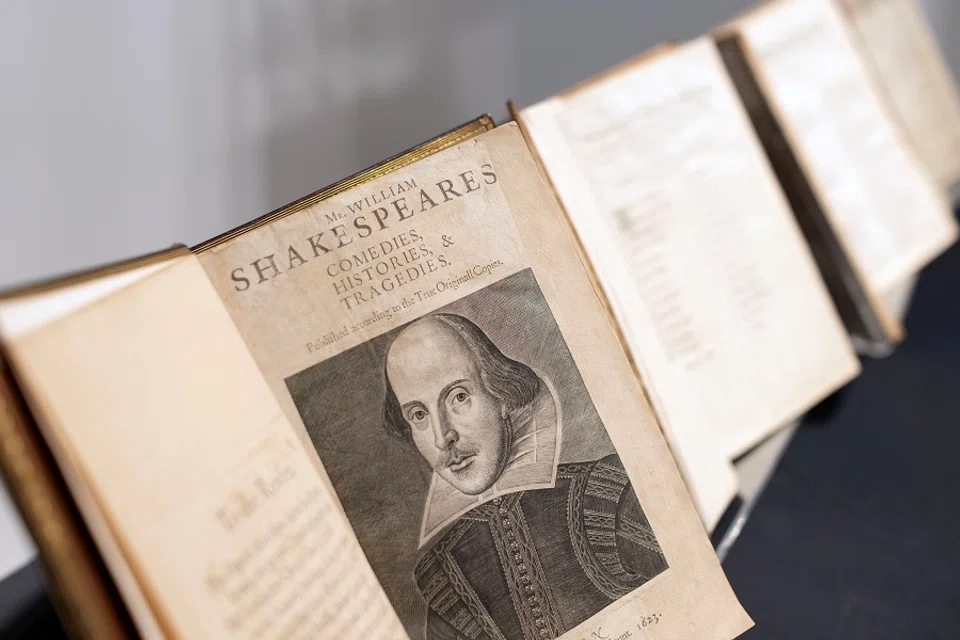
Elizabethan theatre flourished because the conditions were right at the time. An outstanding group of playwrights had emerged: The young Oxford- and Cambridge-trained Christopher Marlowe; Robert Greene; George Peele; Tom Nashe; Thomas Kyd; Ben Jonson; and William Shakespeare, who did not go to university.
But more importantly, public theatres came into being. With outstanding actors playing their part, the shows played to people's preferences and presented various facets of life on stage. The London city council was always interfering, citing political sensitivities, while the conservative churches and Puritans called the theatres immoral venues and wanted them to be shut down. Luckily, Elizabeth I and some court officials enjoyed watching plays and supported the arts, thus becoming an umbrella of protection over theatres and helping them to flourish in the community.
... the design of Elizabethan theatres was pretty simple, resembling the makeshift stages one would observe at religious rituals in rural China.
After the 1580s, theatres, or what was known as "Elizabethan theatres", mushroomed in the suburbs of London. They were open-air raised-platform theatres, with the audience looking down at them from three sides. There was standing room in front of the stage, for which tickets were sold for a mere penny, that is, one cent. This made the theatre even more popular among the common folk.
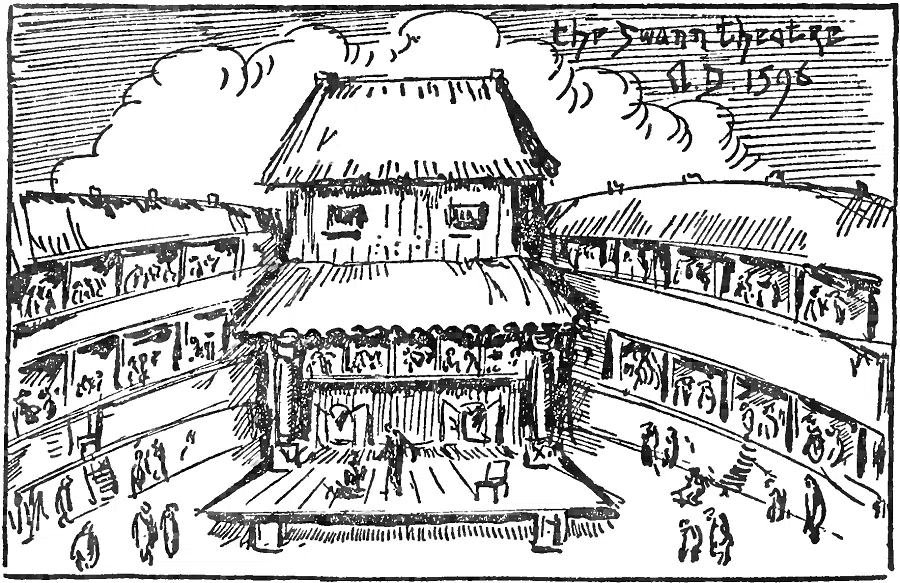
Compared with the architectural design of modern theatres, the design of Elizabethan theatres was pretty simple, resembling the makeshift stages one would observe at religious rituals in rural China. The only difference was that Elizabethan theatres were fortified with permanent wooden structures, allowing for year-round performances. This meant that they were not fly-by-night theatres that could be torn down anytime.
Elizabethan theatre: the entertainment and the politics
However, while the theatres looked pretty ordinary, the plays were extraordinary, giving remarkable playwrights like Shakespeare the chance to display their talents. Though it was difficult for common folk to catch a play, especially if they could not afford expensive seats and had to stand unsheltered in the wind and the rain with their feet covered in mud, people were passionate about watching plays and contributed to the growth of theatre and the legend of Shakespeare's plays.
Playwrights only got 5 to 10 pounds for their labour and they ended up selling away the copyright to their work and not having a say in the final version.
Back then, playwrights were mostly young writers who had gone to university. They devoted themselves to poetry and literature in pursuit of literary fame and recognition from the royal family. But they also sold their plays to theatres to turn a quick buck. Once sold, these scripts became the theatre's property and it was the latter's prerogative to make changes to the text. Playwrights only got 5 to 10 pounds for their labour and they ended up selling away the copyright to their work and not having a say in the final version.
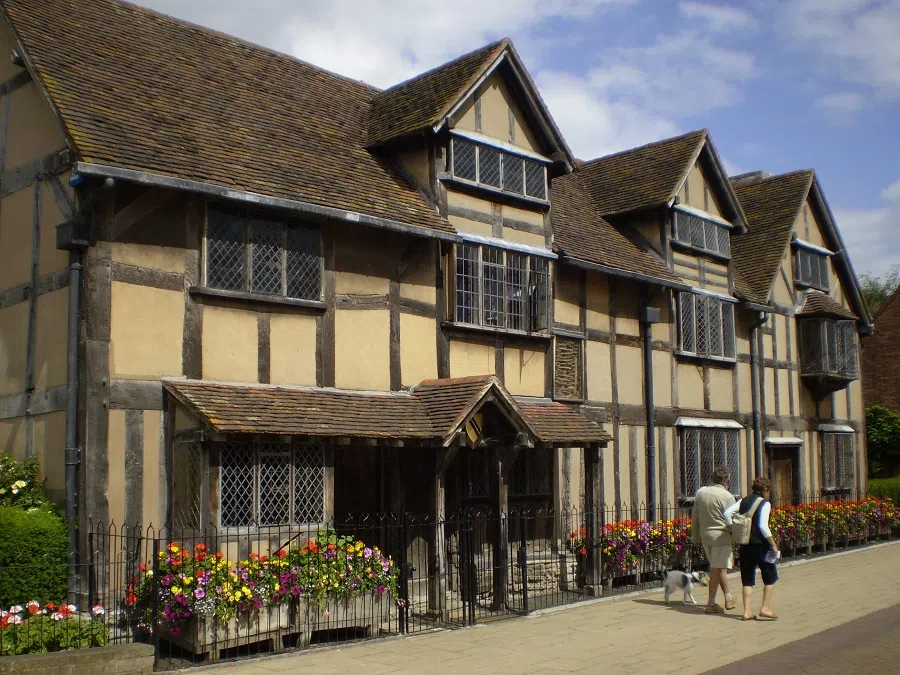
If the play became a big hit, a considerable amount of revenue could be earned from successive performances, but it no longer had anything to do with the playwright. Actors, on the other hand, received a huge share of the profits and lived wealthy lives, with many of them buying houses and properties. Take Shakespeare for example: he bought a huge house and a large plot of land in his hometown of Stratford-upon-Avon and even invested in high-end real estate in London, successfully entering the ranks of the gentry.
Robert Greene believed that he was more talented than the average person. He soon found out that actors earned much more money than playwrights. As a result, he had a chip on his shoulder and became bitter, viciously accusing all actors of being arrogant, greedy and shameless.
Together with Tom Nashe, another highly-educated playwright, the pair referred to actors as the crow in Aesop's Fables, beautified with the feathers of another and "garnished in our colours", that is, not knowing a single line of their own to utter and having the words so loved by the audience actually constructed by the playwrights and the secrets of their knowledge. To these playwrights, actors were worthless and mere "labour machines"; the performance's script was the heart and soul of true talent.
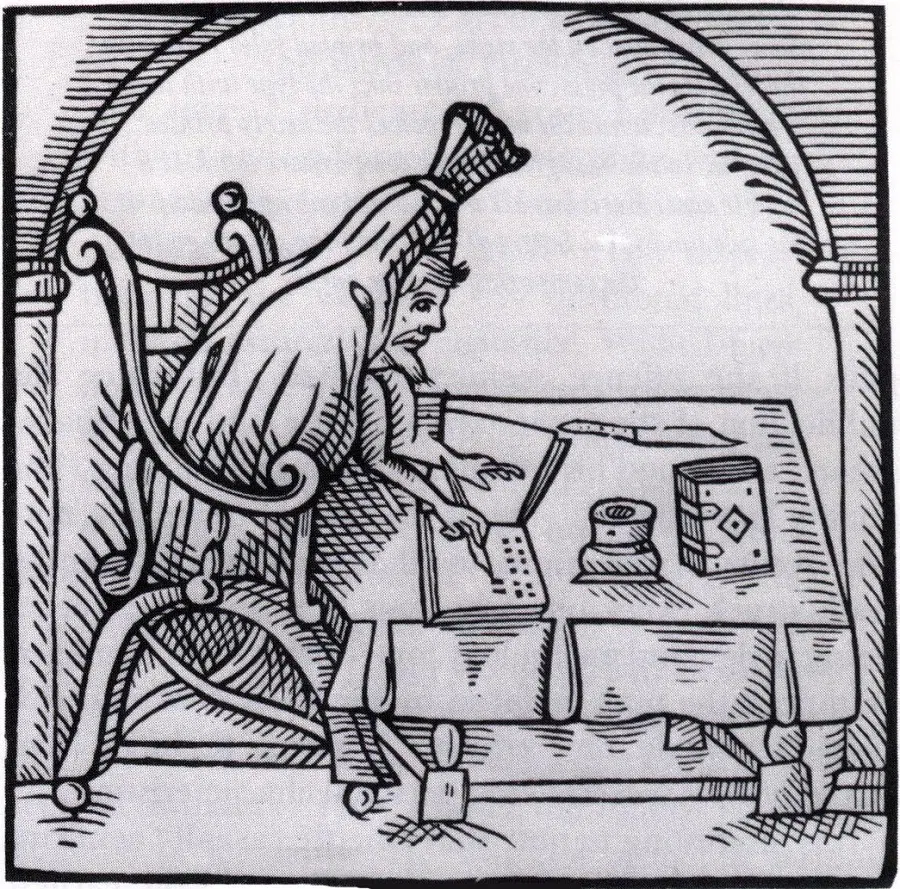
Greene had been unrestrained all his life, adorned with decadence, surrounded by fine wine and women, and unafraid of criticisms from the people, spending money as he wished. It was not until the summer of 1592 that he fell gravely ill and was penniless. Thinking that his time on earth was coming to an end, Greene suddenly felt ashamed of what he did and wrote several confessions containing his repentance.
The actor and the playwright
On his deathbed, he wrote an autobiographical account confessing his bigotry which was later compiled into the book Greene's Groatsworth of Wit Bought With a Million of Repentance by publisher Henry Chettle. The book depicts Greene's dramatic life and mentions how he urged his friends Christopher Marlowe, Tom Nashe and George Peele to stop writing scripts for actors: "... for it is pity men of such rare wits should be subject to the pleasure of such rude grooms." He again insulted the stage actors, calling them "apes", "peasants", and "painted monsters" who are like "puppets" that "speak from our mouths", "garnished in our colours".
Greene said so sarcastically, attacking Shakespeare for "shaking the stage", creating scenes and doing all sorts of things.
He especially detested an actor who also wrote scripts. Although Greene did not specifically mention who that was, it was as if he already did - any discerning person would know at once that Greene was berating William Shakespeare: "... there is an upstart crow, beautified with our feathers, that with his tiger's heart wrapped in a player's hide supposes he is as well able to bombast out a blank verse as the best of you, and being an absolute Johannes factotum is in his own conceit the only Shake-scene in a country."
American Shakespearean scholar Stephen Greenblatt translated "Johannes factotum" as "Johnny do-it-all", which means a "Jack of all trades" or a "would‐be universal genius". Greene said so sarcastically, attacking Shakespeare for "shaking the stage", creating scenes and doing all sorts of things. Greene created the term "Shake-scene" as a pun on Shakespeare's surname, sarcastically describing him as someone who "shakes" the "scene" with a "spear". Greene intentionally created the term so that people would associate it with Shakespeare.
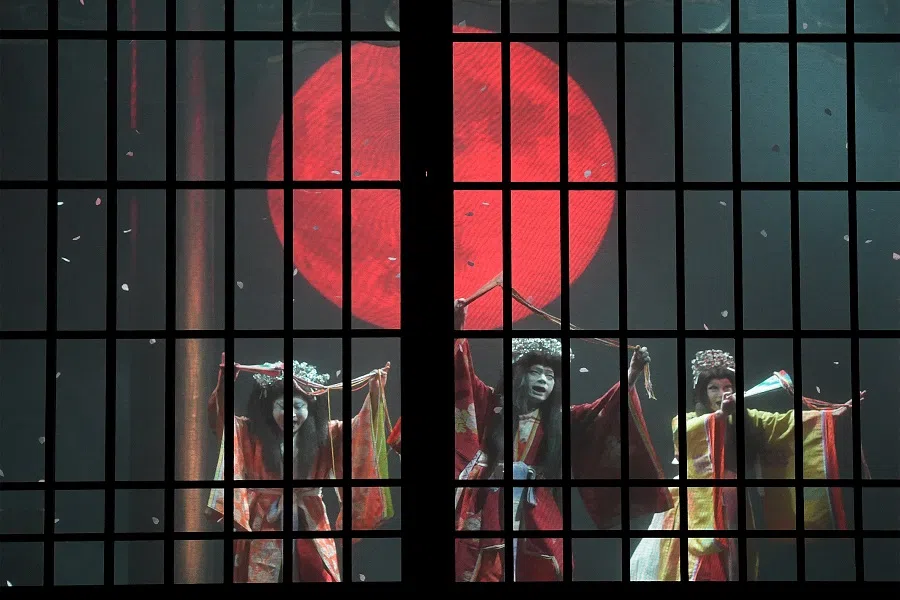
Shakespeare was a shareholder and actor in Lord Chamberlain's Men, the best-known theatre company back then. He was also the company's leading writer, and earned a considerable amount of money. By calling Shakespeare an "absolute Johannes factotum" and an "upstart crow" who creates a "Shake-scene" on stage, Greene had already pointed the finger at Shakespeare directly. As for saying that Shakespeare had "his tiger's heart wrapped in a player's hide", Greene was referencing Shakespeare's play "Henry VI, Part 2", Act I, Scene IV, line 138, where the Duke of York referred to Queen Margaret as a "tiger's heart wrapped in a woman's hide".
Observably, even if Greene had already repented on his deathbed, he was still full of jealousy and hatred for Shakespeare and believed that Shakespeare's fame had been stolen from the talent and works of Greene's generation of writers who had graduated from Oxford and Cambridge.
Henry Chettle, the publisher of Greene's Groatsworth of Wit Bought With a Million of Repentance, was said to have deleted several insults from the book, including the paragraph calling Marlowe an "atheist". Greenblatt inferred that Shakespeare may have been aware of Greene's insults and while he did not refute them publicly, he may have responded to them privately.
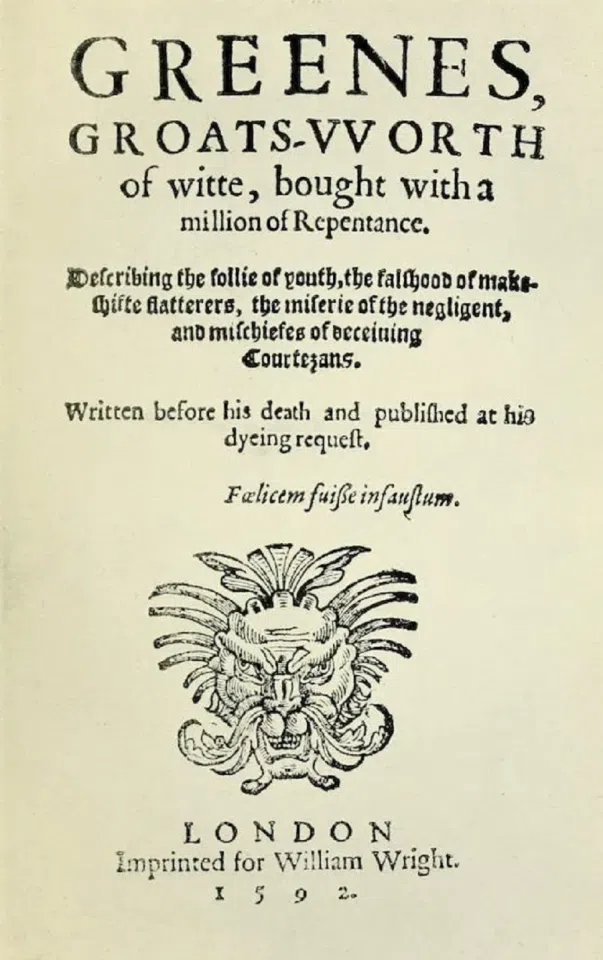
Perhaps Chettle came to realise Shakespeare's generosity and talent from other people later on, and later regretted not having removed the paragraphs chastising Shakespeare: "I am as sorry as if the original fault had been my fault, because myself have seen his [Shakespeare] demeanour no less civil than excellent in the quality he professes." He added, "Besides, diverse of worship [i.e., several important people] have reported his uprightness of dealing, which argues his honesty, and his facetious grace in writing, that approves his art."
Shakespeare did not have an ambitious life goal. He kept it clear and logical, and focused on wealth management, trying to make every penny count.
'Gentle Shakespeare'
Shakespeare was a low-profile man who never stirred up trouble after joining the London theatre company in the late 1580s. He was a commoner who had left his hometown and entered London's theatre industry, relying on himself to get to where he was and cherishing the job of both an actor and a playwright. He lived a simple life in London and basically called the theatre his home, not only playing various characters but also making use of his spare time to write scripts that the audience would enjoy according to the needs of the company. His plays were often inspired by true stories, historical figures or mythology. They were sometimes adapted from popular European plays, polished and refined with his impeccable writing.
If you have to say that Shakespeare is "beautified" with someone else's "feathers", that's not entirely false either, just that the "feathers" from other birds become the feathers of a majestic peacock when they are on him. Shakespeare did not have an ambitious life goal. He kept it clear and logical, and focused on wealth management, trying to make every penny count. The wealth he accumulated was to save his family that had entered into ruin, to repay his father's debt, buy properties, restore the family name, and honour his family. He finally became a member of the gentry in his later years.
Back then, Shakespeare was admittedly Mr Nice Guy, or who Ben Jonson referred to as "gentle Shakespeare".

Greene's criticism and Chettle's praise reflect Shakespeare's identity and status in the Elizabethan theatre business. He was an actor who performed on stage, but also an outstanding playwright who wrote plays for the theatre company. He was not ashamed of his identity as an actor and did not become arrogant even though his scripts won high praises. On stage, he spoke and performed; off stage, he created stories and wrote them. He was neither humble nor arrogant and treated everyone with a nonchalant attitude, earning the respect of the theatre and literary sector. Back then, Shakespeare was admittedly Mr Nice Guy, or who Ben Jonson referred to as "gentle Shakespeare".
The best way to approach Greene's insults is to ignore them. Time washes away all baseless slanders - as Shakespeare's scripts grew increasingly famous with each passing day, they were recognised as England's literary classics by the 18th century. Nobody cared about Greene's criticisms anymore.
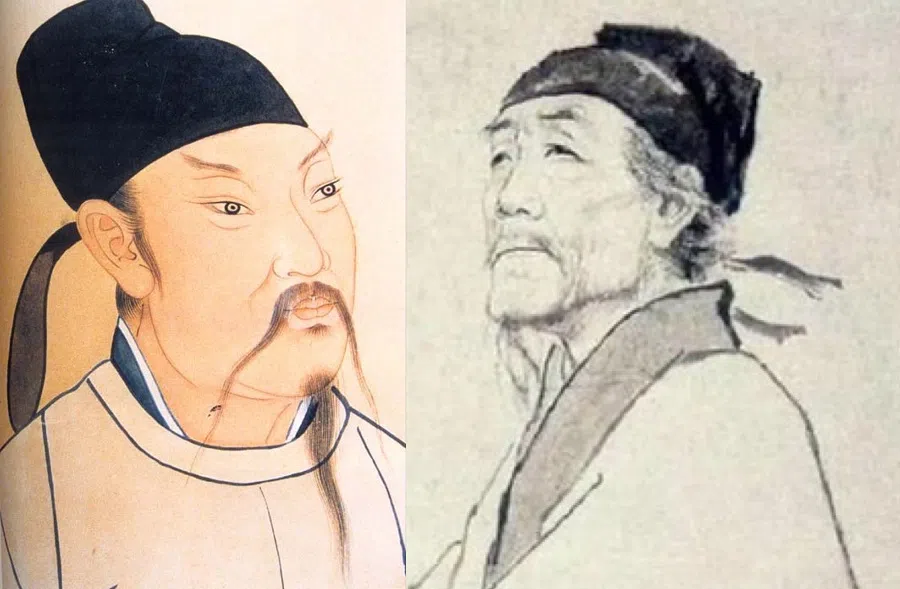
As the saying goes, "Two of a trade never agree." Such scenarios were common and often seen in the history of Chinese literature as well. Tang dynasty essayist Han Yu once wrote a poem heaping praises on Tang dynasty poets Li Bai and Du Fu and attacking those who slandered them. A few lines at the start read: "Li Bai and Du Fu's poems are like a bright light that illuminates the poetry world. But I do not know how some ignorant people are able to use such outdated phrases to slander them. These people are like ants trying to shake a tree. It's laughable to see how much they have overestimated themselves."
Greene would certainly not have read Han's poem. But it seems as if Han's critique was a tailor-made response to Greene's criticism of Shakespeare.
This article was first published in Chinese on United Daily News as "詆毀莎翁" in 2022.
Related: In pursuit of ideals and love: The William Shakespeare of Chinese drama, Tang Xianzu | Snazzy mod-British cuisine to go with Shakespeare and Tang Xianzu | On the dentist's chair: American poet Marianne Moore's scalpel | The balcony: A metaphor for eroticism in Chinese literature | Du Fu and tofu are not the same thing



![[Big read] When the Arctic opens, what happens to Singapore?](https://cassette.sphdigital.com.sg/image/thinkchina/da65edebca34645c711c55e83e9877109b3c53847ebb1305573974651df1d13a)
![[Video] George Yeo: America’s deep pain — and why China won’t colonise](https://cassette.sphdigital.com.sg/image/thinkchina/15083e45d96c12390bdea6af2daf19fd9fcd875aa44a0f92796f34e3dad561cc)
